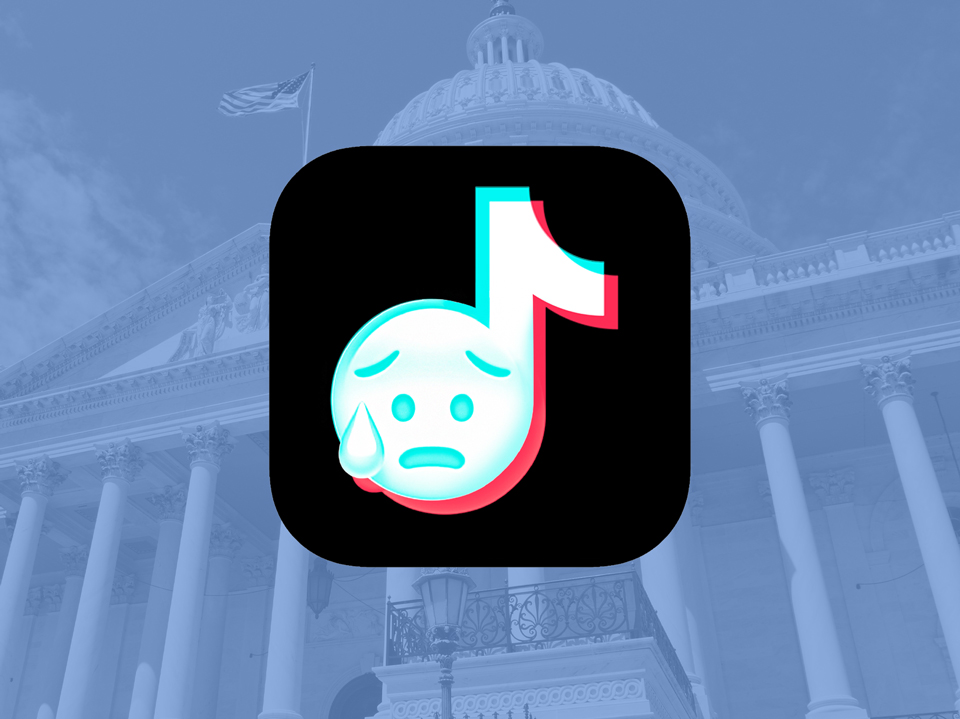If TikTok Gets Banned, Are We All Going to Have a Breakdown?
Your favorite way to feel something or nothing at all might be signing off. Here's how to deal.
TikTok can feel like lip balm for your brain. Soothing. Easy. Immediate gratification. And, by now, years after it first launched in the U.S., TikTok has easily become one of our most reliable coping tools. For better or worse, the social platform swoops in to save us from our feelings. Boredom, stress, loneliness, or anxiety are defenseless against the random life hacks, landscaping makeovers, GRWM vids, and mental health advice from experts (...and some people who are definitely not experts). Maybe that’s why the possibility of TikTok going away seems like a personal attack.
ICYMI, this is all happening because of a bill passed last April, the goal of which was to combat “a significant threat to national security,” according to the bill H.R.815. This comes after reports of serious societal harms like misinformation, problematic algorithms, and extreme privacy issues allegedly caused by the app.
This means that TikTok’s parent company (based in China) would need to sell the app to a company based in a country that’s not a “foreign adversary” by January 19th 2025. If not, the app will become unavailable to U.S. users, according to the proposed bill. Exactly what that means is a little murky, but experts guess that, since the app stores will no longer carry TikTok, new users won't be able to download the app and existing users’ apps will get so buggy they become unusable after January 19th.
If just the idea of life without TikTok makes you feel A LOT of feelings, that makes sense.
Here, we explain why we’re so attached to that sweet, sweet TikTok algo, why it’s OK to be legit freaked out by the potential loss, and how to use that emotional intel to set yourself up for success if it does go away.
Why does TikTok have such a chokehold on us?
If you learned about dopamine detoxes (on TikTok lol), then you probably know that social media can be one of your brain’s favorite sources of the feel-good neurotransmitter, dopamine.
ICYMI, dopamine is part of our internal reward system and enables us to feel pleasure. It’s the same response we get when we hear the intro to a song we like or take the first bite of something delicious. That’s why psychotherapist Courtney Tracy, LCSW, PsyD, founder of Exist mental health and substance use treatment center, refers to the platform as “brain candy.”
While dopamine is the thing our brains want, it’s the “intermittent rewards,” or inconsistent hits of the neurotransmitter that keep us scrolling or mindlessly opening the app without even realizing it, explains media psychologist Don Grant, PhD, who researches digital engagement behaviors and their possible impacts on mental health. Our brain gets bored if the positive reinforcement is too predictable, so it seeks out experiences in which there’s potential for the prize that is dopamine, Dr. Grant adds.
Although there isn’t enough scientific evidence to prove TikTok (or any other social platform) is addictive, using TikTok can supply the same neurological rewards that have been proven to lead to other habit-forming behaviors, says Dr. Grant.
TikTok’s algorithm is particularly “sticky” or engaging because it’s serving up stuff that’s already made you feel good in the past, Dr. Grant explains. Ah yes, the algorithm. And even though other social and streaming platforms rely on a similar algorithm of suggestions based on stuff you like, TikTok seems to do this especially quickly and seamlessly. “This property correlates with other established substance- and process-type dependencies and addictive-type behaviors,” says Dr. Grant.
That feel-good effect could be amplified for those who lean on TikTok for a sense of community. Whether you have a disability, are a stay-at-home parent, are an LGBTQ+ person in a small town, or feel generally isolated in real life, you might feel more validated and less alone among these pockets of content, creators, or commenters who remind you of you, per a small scientific survey published for a conference of the Association of Computing Machinery.
Even if you’re not coming to TikTok to meet people who get you, the “seemingly raw, uncut, and unpolished” nature of the creators and content (vs what you see on other social media platforms) “makes us feel like we know the people in these videos on this deep level—even if it’s all curated,” says therapist Moraya Seeger DeGeare, LMFT.
It’s a kind of parasocial voyeurism, DeGeare explains, which can make us feel close to the people and things we see on the app without much effort. That could be why you kept coming back to the app to see if Charlotte the stingray was impregnated by sharks or through immaculate conception.
All of this, plus the entertainment value, makes TikTok the ultimate place to dissociate, which can be good and bad, Dr. Tracy (aka The.Truth.Doctor on TikTok) explains.
Here’s what a TikTok withdrawal could feel like.
Don’t worry, “TIkTok withdrawal” is not an actual mental health symptom. But if you spend a lot of time on the app or use it in any of the scenarios above, you could experience some uncomfortable emotions if you stop using it. That could look like a sense of loss or emptiness, says Dr. Tracy. Others might just feel bored. There could also be a certain level of anxiety that stems from the disruption of your daily TikTok routine. As you’re falling asleep at night without scrolling, you might feel a dissatisfaction you can’t quite put your finger on, explains DeGeare. You might find yourself mindlessly toggling through other apps seeking the same dopamine rush you got from TikTok.
If you’ve found a TikTok community you interact with frequently, the feelings of distress could be more intense, almost like a mini-version of losing a friend, Dr. Tracy adds. “It’s totally understandable to be outraged [by the potential loss of TikTok], especially if you feel someone is taking away your community, your access to information, or your ability to understand people on the other side of the world,” DeGeare says. “Especially now.”
How can you emotionally prep for a TikTok ban?
It’s not a bad idea to prepare thyself for the worst, Dr. Tracy says. Anytime we’re losing something that means a lot to us (yes, even the thing that makes long lines for the bathroom more bearable), it‘s helpful to create a plan.
That’s especially true if you’re upset just thinking about what could happen next. Here, we asked experts how to manage that outrage whether the platform exists or not, so you can get into a more positive headspace without the Tok.
1. Assess how TikTok is serving you.
Sure, you could just find another go-to social app to lean on instead of TikTok, but you’re setting yourself up for the same infinite scroll issues by relying on any one thing for joy, entertainment, or to relieve stress, explains Sarah Domoff, PhD, a clinical child psychologist and an assistant professor of psychology at the University of Albany.
This moment of TikTok peril could be an opportunity to assess your mental and emotional needs and the tools you use to meet them. The more options you have, the better off you’ll be when you need to use them, says Dr. Domoff, who studies problematic media use during childhood.
To figure out what you’re actually getting out of TikTok, think about what’s making you react so strongly to a possible ban. Do you get validation from the app? Community? A boredom-free life? Do you learn new facts or recipes? Do you get your news here?
It can help to journal on this, DeGeare says. Spend 15 minutes on the app to refresh your memory (or think about the things you miss the most about it), then put your phone down and start writing down what you liked about this experience.
2. Fill those voids.
Then, make another list detailing what activities or outlets could provide similar (or maybe even better!) benefits, DeGeare suggests. You don’t need to “mine for dopamine” on TikTok when “there’s a river of feel-good chemicals out in the real world,” Dr. Tracy says.
If you opened the app to take a break from real life (work, kids, school, your general existence, etc.), try listening to a podcast and going for a walk or taking a bath with good music. These feel-good breaks have benefits that last long after you’re done with them (unlike scrolling).
You can also practice some grounding exercises to become more OK doing nothing, like focusing on one object, smell, or sound for a while, DeGeare says. We often get the message that our worth is related to accomplishing things. So doing nothing is uncomfortable and powerful, she adds.
When in doubt, focus on activities that provide human contact. When we’re feeling low, the things that help us get back to baseline are almost always real personal connections, says Dr. Grant. “When we laugh, cry, celebrate, grieve, mourn, and build each other up in real life—that’s what makes us human,” Dr. Grant says.
So if you had a group of friends you followed online, schedule a Zoom with them, or use this as an excuse to organize an overdue in-person catch-up. You can also call any friend up to commiserate over coffee, go on a walk with your neighbor, or call your mom, DeGeare says.
Still, we hear you: These require more effort and we’re all busy and tired. But despite the legwork, bonding with others (or even yourself) outside of the internet is a positive way to cope with life. And if it involves other people, those actions can provide a longer-lasting benefit in the form of positive memories, Dr. Grant says. That tops the quick buzz or escapism you get from swiping up on social, Dr. Grant explains.
3. Cut back on screen time.
Yes, adding in other apps or experiences to manage your feels is a good move, but if journaling made you realize that your emotions or mood are maybe, kind of dependent on social media in general, it can’t hurt to taper your time spent on it.
Try timing yourself. How many minutes or hours do you spend on social apps each week? (You can also just check your usage through the Apple Screen Time app or in your Android settings app.) Then, see if you can cut it down by 20, 10, or just 5 minutes a week. Baby steps.
If you can’t stick to that time limit, that could be a red flag, says Dr. Tracy. In that case, you could delete or log out of the apps after you use it, since the annoyance of re-entering your password may be enough to deter you. Take that, instant gratification! self. How many minutes or hours do you spend on the app each week? (You can also just check your usage through the Apple Screen Time app or in your Android settings app.) Then, see if you can cut it down by 20, 10, or just 5 minutes a week. Baby steps.
If you can’t stick to that time limit, that could be a red flag, says Dr. Tracy. In that case, you could delete or log out of the app after you use it, since the annoyance of re-entering your password may be enough to deter you. Take that, instant gratification!
Wondermind does not provide medical advice, diagnosis, or treatment. Any information published on this website or by this brand is not intended as a replacement for medical advice. Always consult a qualified health or mental health professional with any questions or concerns about your mental health.




